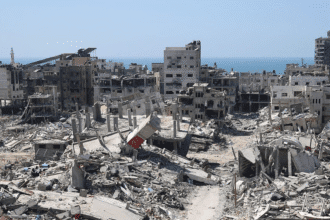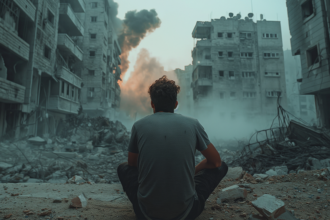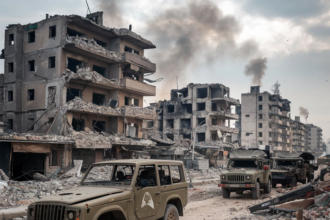UN urges restraint as Israeli forces target militants in Jenin, Tulkarm, and Far’a. Palestinian deaths rise while international concerns escalate.
What Is Happening with Israeli Forces in the West Bank?
Israeli troops have escalated their activities in the seized West Bank for the second day running, resulting in a growing death toll and extensive appeals for de-escalation. The Israel Defense Forces (IDF) declared starting a “counter-terrorism operation” on Wednesday. Israeli military activity by Thursday had claimed four additional lives in Far’a and twelve in Jenin and Tulkarm.
According to the Palestinian health ministry, sixteen Palestinians had died since the Wednesday morning operation started. The raids have raised tensions; the United Nations and the European Union express grave worries about the increase in violence in the area.
Why Is the UN Calling for an Immediate Halt to Israeli Operations?
Warning that the military action was “fueling an already explosive situation,” the United Nations has urged Israel to stop its activities in the West Bank instantly. Calling on Israeli soldiers to “exercise maximum restraint and use deadly force only when it is strictly unavoidable,” UN officials The statement captures rising global concern over the quickly worsening conditions in the occupied areas.
What Are the Details of Clashes in Jenin, Tulkarm, and Far'a?
The IDF claims that during “exchanges of fire” with militants hiding within a mosque, five persons were killed in Tulkarm. Furthermore mentioned by the military were seven deaths in Jenin. Among the deceased was Mohammed Jaber, sometimes known as Abu Shujaa, the claimed Tulkarm Brigade local leader supported by the Palestinian Islamic Jihad terrorist organization. Jaber allegedly participated in many attacks on Israelis and was preparing further strikes, according to the Israeli military.
Though they did not directly identify Jaber, the Tulkarm Brigade retaliated by publishing a message on Telegram claiming that their soldiers had attacked an Israeli army unit “in response to the assassination of our commander.”
Israeli troops claimed killing four armed terrorists in a car near Far’a. The IDF said they had seized weapons and explosives and arrested ten people sought for terrorism-related acts during their operations in Tulkarm and Jenin.
How Are Palestinians Reacting and What Are the Allegations of Civilian Targeting?
In a letter on Thursday, the Palestinian Mission to the UN denounced the Israeli incursions and charged the IDF with extensive crimes. The letter said Israeli troops had “invaded homes, deliberately targeted civilians, destroyed vital infrastructure, and even besieged the four main hospitals in the area.” The charge of attacking citizens and restricting medical access aggravates the already strained situation in the area.
The IDF responded to the accusations by citing earlier remarks claiming that it had mainly targeted armed militants, some of whom had been connected to past strikes on Israeli citizens.
What Is Happening in Jenin's Refugee Camp?
Jenin, a city long a hotspot in the war, remained the main emphasis of the Israeli assault. Israeli military jeeps around the government hospital were allegedly stopping and searching ambulances as security guards stayed in Jenin’s refugee camp. Serving as a base for various armed organizations, the camp is also home to many unarmed citizens and has seen frequent conflict over the years.
Israeli troops have restricted access to the camp, while disturbances to Palestinian phone networks have further isolated the region. Based on accounts from Israeli media, the military operation might last several days. Therefore, it is among the most significant such measures in the West Bank since the second Palestinian intifada two decades ago.
How Is Israel Justifying Its Actions?
Israeli officials justified the operation with continuous military activity, saying that its “clear goal: preventing Iranian terror-by-proxy that would harm Israeli citizens.” Supporting both Hamas and the Palestinian Islamic Jihad, Israeli officials have lately accused Iran of trying to sneak explosive devices into the area to start assaults on Israel. An official noted on X (previously Twitter), “Israel cannot sit idly by and wait for the spectacle of buses and cafes exploding in city centers.”
What Are the International Concerns Over Escalating Violence?
The operations coincide with an increase in West Bank violence following an attack on Israel by Hamas on October 7 and the ensuing conflict in Gaza. The deep worry expressed by international players, notably the European Union, over the military actions in the West Bank potentially causing the war to spread further is justified.
The head of European Union foreign policy, Josep Borrell, issued a strong warning that Israel’s actions “must not constitute the premises of a war extension from Gaza.” He also declared that he was starting conversations with EU members over the likelihood of penalties against certain Israeli ministers. Borrell charged these ministers—who he did not name—of “launching unacceptable hate messages against the Palestinians, and proposing things that go against international law.”
The world community keenly observes as the crisis develops; demands for moderation and communication become stronger among worries that the conflict would spiral out of hand.








